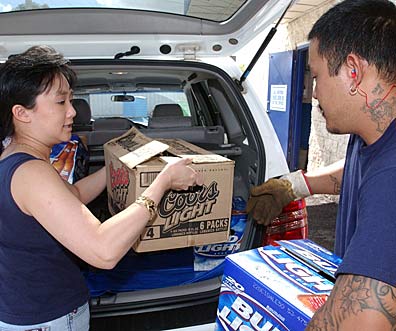
|
Kokua Line
|

|
Unredeemed cans
fund handling fees
Question: So we're paying recyclers 1 to 2 cents more per container than the state is collecting for the recycling fund and they expect this program to be run systematically and well (Kokua Line, Jan. 6)? How can the state justify the extra expenditure to recyclers just based on recycling? The 2 to 3 cents per container paid to them will be more expensive over the long run than putting the cans in the landfill!Answer: The handling fees being paid recyclers -- 2 cents for Oahu companies and 3 cents to neighbor island companies -- come not just from the 1-cent nonrefundable handling fee paid by consumers, but from deposits paid, but never redeemed.
Under other states' deposit programs, most people apparently turn in their containers, according to statistics.
The state is relying on the experience of other states when it comes to expected redemption rates.
In other states that have similar deposit programs, in the "best case," about 80 percent of the containers are redeemed for their 5-cent deposits, said Laura Lott, spokeswoman for the state Department of Health, which is overseeing the container deposit recycling program.
Therefore, the Health Department "believes that the current 2- or 3-cent payments to recyclers is sustainable," she said.
However, if there is not enough money in the Beverage Container Deposit Special Fund coming from unredeemed deposits, Lott said there is a provision in the state law that allows the 1-cent recycling fee to be raised to 1.5 cents.
In the meantime, "The fees paid to the recyclers do not affect the amount paid per container by consumers," Lott said.
Reverse vending
While the state, recycling companies and consumers continue to work their way through the frustrating and often time-consuming process of redeeming recyclable containers, at least one company sees a new market for its product.Envipco, based in Naugatuck, Conn., sells or leases reverse vending machines and bills itself as "the industry leader in the field of reverse vending."
It currently has the machines in 6,500 supermarkets on the mainland, according to Kevin McKenna, its vice president of sales and marketing.
The company has projected Hawaii to be a 1,000-machine market, he said, but acknowledges frustration in trying to convince local retailers that having the machines not only is customer friendly, but is just makes good business sense.
There currently is resistance among local retailers, notably the large grocery chains, to set up the machines on their properties.
So far, there are only a handful of those machines available in Hawaii.
On Oahu, Rolloffs Hawaii/Reduce Reuse Recycling Services operates a mobile redemption center with six Envipco machines.
McKenna says Envipco has 200 machines already in Hawaii or in transit ready to be installed.
So far, the military has contracted Envipco to install the machines, including at Hickam and Schofield, he said. He plans to be in Hawaii this coming week to try to get more retailers interested.
McKenna contacted us after reading the Jan. 6 Kokua Line regarding complaints about consumers being reimbursed for their deposits by weight rather than per container. Many felt they are being shortchanged.
The state Department of Health recommended consumers either redeem fewer than 100 cans at a time, if they want individual hand counts, or to seek out reverse vending machines.
Consumers in 11 other states can redeem their bottles and cans at the same place they were purchased, McKenna noted.
Based on Envipco's figures with its 6,500 supermarket clients, he said 99 percent of deposit vouchers are spent the same day in the same store.
He's armed with such figures to try to convince local retailers to install the reverse vending machines.
According to McKenna, Envipco leases its machines for about $450 a month each, with a $125 monthly service contract, which includes maintenance, pickup of containers and handling the payment of the deposits between retailers and the state.
Mahalo
To Paul Izumi. On Dec. 15, my friend and I rode the new E-Bus for the first time after shopping. With all the packages we had, I forgot to grab my purse containing money, credit cards, cell phone and house and car keys as we got off. We called TheBus, but they were unable to do anything until the driver returned to the bus barn. It was over an hour and we thought all was lost until my son decided to call my cell phone. Mr. Izumi answered, about to leave his house in Manoa to deliver my purse to my home in Waikiki. He said he saw the purse on the seat and took it with him to return to the owner. We met him at his home. I am so grateful and fortunate to have someone so kind and honest like him find my purse. Thank you, Mr. Izumi. I will be more careful in the future. -- Y. Watanabe
|
Call 529-4773, fax 529-4750, or write to Kokua Line,
Honolulu Star-Bulletin, 500 Ala Moana Blvd., No. 7-210,
Honolulu 96813. As many as possible will be answered.
E-mail to kokualine@starbulletin.com
[News] [Business] [Features] [Sports] [Editorial] [Do It Electric!]
[Classified Ads] [Search] [Subscribe] [Info] [Letter to Editor]
[Feedback]
